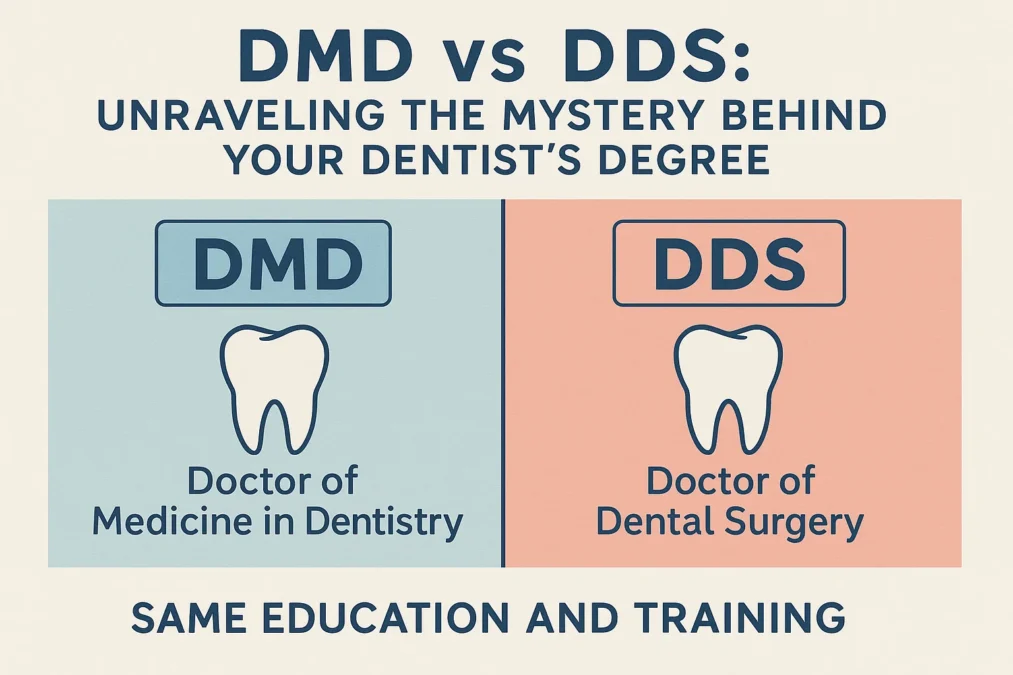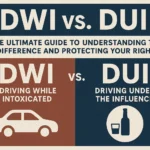You’re sitting in the dental chair, the bright light overhead, and you glance at the diploma on the wall. The letters after your dentist’s name stare back at you: DDS. Or is it DMD? You might have wondered, in a fleeting moment between cleanings or during a lengthy procedure, what those letters truly mean. Is one better than the other? Does a DMD possess a different kind of expertise than a DDS? If you’ve ever been curious, you’re not alone. This is one of the most common points of confusion in the world of oral healthcare.
The truth is, the difference between a DMD (Doctor of Medicine in Dentistry or Doctor of Dental Medicine) and a DDS (Doctor of Dental Surgery) is far less dramatic than many people assume. In fact, when it comes to the education, training, and licensing required to practice dentistry, there is no practical difference between the two. The distinction is primarily historical and linguistic, a relic of how dental education evolved differently across various institutions. Both degrees represent the same rigorous level of qualification. Both DDS and DMD professionals are fully licensed dentists who have completed extensive academic and clinical training to diagnose, treat, and manage your overall oral health needs. This article will serve as your definitive guide, demystifying the dmd vs dds debate once and for all, and empowering you to understand the credentials of the professional you trust with your smile.
The Historical Roots of the Two Degrees
To understand why we have two different degrees for the same profession, we need to take a trip back in time to the origins of formal dental education in the United States. The first dental school in the world, the Baltimore College of Dental Surgery, was established in 1840. This pioneering institution awarded the DDS, or Doctor of Dental Surgery, degree. This title was chosen to reflect the surgical aspects of dental care, such as tooth extractions and oral surgery, which were significant components of dental practice at the time. The term “Surgery” firmly placed dentistry within the broader field of medical surgical disciplines.
As dental education continued to evolve, new schools opened, and many followed the precedent set by Baltimore, adopting the DDS degree. However, in the late 19th century, Harvard University decided to add a dental school to its prestigious medical program. Harvard, like many Ivy League institutions, has a tradition of using Latin for its academic degrees. In Latin, the degree is “Doctor Medicinae Dentariae.” Harvard chose to translate this as “Doctor of Dental Medicine,” or DMD, to align with its existing medical degree nomenclature. This was not an indication of a different or superior curriculum; it was simply a linguistic and academic preference that reflected the university’s heritage. So, the creation of the DMD degree was born from a translation choice, not an educational divergence.
This decision by Harvard created a fork in the road. From that point forward, some dental schools adopted the DDS title, following the original model, while others, particularly those wanting to emulate Harvard’s classical approach, adopted the DMD title. There was no governing body that mandated one over the other, leading to the coexistence of the two degrees that continues to this day. This historical accident is the sole reason for the dmd vs dds confusion that persists over a century later. It’s a tale of two founding institutions setting different precedents that the rest of the educational world followed without any standardized directive.
So, What Do DDS and DMD Actually Stand For?
While we’ve touched on the definitions, it’s worth diving a little deeper into the precise meaning behind the acronyms to fully appreciate their intended message. DDS stands for Doctor of Dental Surgery. The key word here is “surgery.” This title emphasizes the procedural and operative aspects of dentistry. It encompasses everything from filling a cavity, which is a restorative surgical procedure on a tooth, to performing a root canal, placing dental implants, and extracting wisdom teeth. The DDS degree frames the dentist as a surgical specialist focused on the health and structure of the teeth and jaws.
On the other side of the dmd vs dds equation, we have DMD, which can stand for one of two things: Doctor of Dental Medicine or Doctor of Medicine in Dentistry. Both translations point to the same concept: a broader, more medically oriented view of oral health. The term “Medicine” suggests a focus on the systemic and diagnostic connections between oral health and the health of the entire body. A DMD is positioned not just as a technician for the mouth, but as a physician for the oral and maxillofacial region, understanding how conditions like diabetes, heart disease, and pregnancy can manifest in and affect the mouth.
In a modern context, however, this semantic difference is almost entirely theoretical. Whether a dentist is a DDS or a DMD, their education requires them to be both a surgeon and a physician for the mouth. They must be adept with a drill and a scalpel, but they must also be skilled diagnosticians, capable of reading X-rays, identifying oral cancer, understanding the pharmacology of medications they prescribe, and recognizing signs of systemic disease. The choice of degree title does not limit a practitioner’s scope or focus; it merely reflects the historical naming convention of their alma mater. The functional overlap in their daily practice makes the dmd vs dds distinction irrelevant in terms of the care they provide.
The Identical Educational and Licensing Pathways
Perhaps the most critical piece of evidence in the dmd vs dds discussion is the fact that the educational journey to become either type of dentist is exactly the same. There is no shortcut or harder path; all aspiring dentists in the U.S. must navigate an identical series of challenging hurdles. It begins with a rigorous undergraduate education, typically with a heavy emphasis on the sciences—biology, chemistry, physics, and organic chemistry. Maintaining a high GPA in these difficult courses is essential for even being considered for dental school.
The next step is the Dental Admission Test (DAT), a standardized exam that assesses a candidate’s academic capacity and perceptual ability. Competition for dental school seats is fierce, and high DAT scores are a non-negotiable part of a successful application. Once accepted, the real work begins. The four-year curriculum at an accredited dental school is intensive and comprehensive, regardless of whether the school awards a DDS or a DMD. The first two years are predominantly classroom and lab-based, covering subjects like anatomy, physiology, biochemistry, pharmacology, and dental materials science. Students learn about the structure and function of the entire human body, with a deep dive into the head and neck.
The final two years of dental school are dominated by clinical training. Under the supervision of licensed faculty, students treat real patients. They learn and perform procedures in all the major dental disciplines: operative dentistry (fillings), prosthodontics (crowns and dentures), periodontics (gums), endodontics (root canals), oral surgery, pediatric dentistry, and more. This clinical experience is where theoretical knowledge is transformed into practical skill. Upon graduation, whether a student receives a DDS or a DMD, they have completed the same foundational education and are equipped with the same core competencies. After graduation, every dentist must pass both a national written board examination and state or regional clinical board examinations to obtain a license to practice. The licensing boards do not differentiate between a dmd vs dds; they are concerned solely with whether the candidate has met the uniform standard of knowledge and clinical skill.
Specializations: The Real Differentiator in Dentistry
If the degree itself (DDS or DMD) doesn’t indicate a difference in skill or focus, what does? The answer lies in post-graduate specialization. This is the true differentiator in the dental field and a far more important factor for patients to consider than the dmd vs dds question. After completing their general dental degree, some dentists choose to pursue additional years of advanced education in a specific area of dentistry. These residency programs are highly competitive and provide intensive, focused training.
For example, an orthodontist is a dentist who has completed a two-to-three-year residency program dedicated solely to the diagnosis, prevention, and correction of misaligned teeth and jaws. They become experts in braces, clear aligners, and other appliances. An oral and maxillofacial surgeon undergoes a four-to-six-year residency, often in a hospital setting, learning to perform complex surgeries like wisdom tooth extractions, dental implant placement, and corrective jaw surgery. An endodontist specializes in root canal therapy and diagnosing tooth pain, having completed a two-year program focused solely on the interior of the tooth.
Other specialties include periodontics (gum disease and implant placement), prosthodontics (complex crown, bridge, and denture work), pediatric dentistry (care for children), and oral pathology (diagnosis of oral diseases). When a dentist becomes a specialist, they are awarded a certificate in that specialty, and some may also earn a master’s degree. This specialized training is what truly sets a dentist’s expertise apart. So, when choosing a dentist for a specific need, a patient should be far more interested in whether the dentist has advanced training in that area than whether their diploma says DDS or DMD. The dmd vs dds debate is a distraction from the more meaningful question of a dentist’s post-graduate education and areas of focused practice.
How to Choose the Right Dentist for You
Given that the dmd vs dds distinction is meaningless, how should you, as a patient, go about selecting a dental care provider? The decision should be based on factors that genuinely impact the quality of your experience and the health of your smile. First and foremost, consider the dentist’s reputation and reviews. In the digital age, patient testimonials on platforms like Google, Yelp, and Healthgrades can provide invaluable insight into a practice’s environment, chair-side manner, and clinical quality. Personal recommendations from friends, family, or your physician are also incredibly reliable.
Another crucial factor is the overall philosophy and atmosphere of the dental practice. Some practices are very high-tech, utilizing the latest in digital scanners, 3D imaging (CBCT), and laser dentistry. Others may have a more traditional, personal feel. During your first visit, pay attention to the cleanliness of the office, the friendliness of the staff, and how well the dentist communicates. A good dentist should listen to your concerns, explain procedures and options in a way you can understand, and make you feel like a partner in your own oral health care. This human connection is infinitely more important than the three letters after their name.
You should also consider practical matters like the location and office hours. Is the practice conveniently located from your home or work? Do their hours fit your schedule? Furthermore, it’s essential to verify that the dentist is within your dental insurance network if you have coverage, or to understand their payment policies and financing options if you do not. Ultimately, the right dentist for you is one you trust, feel comfortable with, and who provides high-quality, compassionate care. The dmd vs dds question should not even factor into your decision-making process, as it has no bearing on a dentist’s capability, skill, or dedication to patient care.
The Global Perspective on Dental Degrees
The dmd vs dds conversation is largely a North American phenomenon. How does the rest of the world handle dental credentials? It’s a fascinating look into how different educational systems approach the same profession. In many countries, including the United Kingdom, Australia, and several nations across Asia and Africa, the common dental degree is the Bachelor of Dental Surgery (BDS). Despite the “Bachelor” title, the BDS is a professional, primary dental degree equivalent in scope and duration to the DDS or DMD in the United States. The use of “Bachelor” is a reflection of the British educational system, and BDS graduates are fully qualified dentists.
In other parts of the world, such as Latin America and many European countries, the degree might be a Doctor of Dental Surgery (DDS) or a Doctor of Odontology (Dr. Odont.). The specific title varies, but the underlying principle is universal: the individual has completed a university-level program that qualifies them to practice as a dentist. For a dentist trained outside the U.S. to practice here, they must go through a rigorous process of credential evaluation and often complete an advanced placement program at an American dental school to ensure their training meets U.S. standards, regardless of what their original degree was called.
This global variation further underscores the point that the specific name of a dental degree is arbitrary. What matters is the accreditation of the institution that granted it and the licensing of the practitioner by the local regulatory body. Whether a dentist holds a DDS, a DMD, a BDS, or a Dr. Odont., the key is that they are properly educated and licensed to provide care in their jurisdiction. The dmd vs dds debate is a parochial issue that vanishes when you look at the international dental community, where the focus is squarely on competency and credentials, not acronyms.
Common Misconceptions and Myths Debunked
Despite the facts, several myths persist in the public consciousness regarding the dmd vs dds topic. One of the most common misconceptions is that a DMD is a medical doctor who specializes in dentistry, while a DDS is not. This is completely false. Neither a DDS nor a DMD is a Medical Doctor (MD). Both are doctors of dentistry. While their training includes a significant amount of medical science, their professional focus and licensing are exclusively dedicated to oral health. A dentist would need to complete a separate medical school program to become an MD.
Another pervasive myth is that one degree is more prestigious or indicates a better education than the other. People might assume that because Harvard awards a DMD, all DMD degrees must be from more elite institutions. This is simply not true. There are top-tier, world-renowned dental schools that award the DDS degree, such as the University of Michigan, UCLA, and the University of North Carolina. Similarly, there are less prominent schools that award either degree. The quality of a dental school is determined by its faculty, facilities, and curriculum, not by whether it awards a DDS or a DMD. Judging a dentist by their degree type is like judging a book by its font.
A third myth is that the degree type dictates a dentist’s approach to care—that a DMD is more “holistic” or “medically-minded,” while a DDS is more “drill-and-fill.” As we’ve established, the education is identical, and a dentist’s personal philosophy and practice style are shaped by their own experiences, continuing education, and personal interests, not by the Latin root of their degree. A DDS may have a very conservative, prevention-oriented approach, while a DMD might be an expert in complex oral surgery. Assuming otherwise based on the dmd vs dds designation is a gross oversimplification of a professional’s complex skill set and approach to patient care.
The Ultimate Guide to Dysport vs Botox: Choosing the Right Neurotoxin for You
The Future of Dental Degree Titling
Will the dental profession ever standardize under one degree title to eliminate the perpetual dmd vs dds confusion? This is a question that surfaces from time to time within professional circles. There have been discussions and proposals, particularly from the American Dental Association (ADA), to adopt a single, unified degree title. The logic is clear: it would simplify public understanding and present a more cohesive professional image. However, the forces of tradition and institutional identity are powerful.
Many universities with long histories are deeply attached to their chosen degree nomenclature. For a school like Harvard, the DMD degree is a part of its brand and heritage. Similarly, schools that were among the first to grant the DDS degree feel a strong connection to that original title. Changing a degree name is not a simple administrative task; it involves altering university statutes, accreditation documents, and a deeply ingrained identity. The cost and bureaucratic effort involved are significant deterrents. Therefore, while the idea of a single degree is appealing from a public relations standpoint, it is unlikely to happen in the foreseeable future.
Instead, the responsibility falls on the profession itself—individual dentists, dental associations, and dental schools—to actively educate the public. The ADA’s official position is that the two degrees are identical, and they encourage dentists to clarify this for their patients. The future, then, is not one of unified titling, but of unified messaging. By consistently explaining that the dmd vs dds difference is merely a matter of semantics, the dental community can finally put this century-old question to rest, allowing patients to focus on what truly matters: the quality of the relationship with their oral healthcare provider.
Conclusion
The journey to understand the difference between a DMD and a DDS begins with a question and ends with a revelation of surprising simplicity. The long-standing dmd vs dds debate is a historical artifact, a linguistic divergence without a practical distinction. From the hallowed halls of the first dental school in Baltimore to the classical traditions of Harvard, two paths were forged, but they lead to the exact same destination: a highly qualified, rigorously trained, and fully licensed dental professional. The education, the clinical training, the licensing exams, and the scope of practice are indistinguishable between the two.
As a patient, your energy is best spent on factors that genuinely influence your care. Seek a dentist with a good reputation, a comfortable practice philosophy, and a communicative style that puts you at ease. Pay attention to their continuing education and any specializations that meet your specific needs. Let go of the notion that the letters on the diploma hold any secret meaning. Whether your dentist is a Doctor of Dental Surgery or a Doctor of Dental Medicine, you can be confident that you are in the care of a dedicated expert committed to your oral health. The next time you see those letters, you can smile, knowing that the mystery of dmd vs dds has been solved, and the real focus can remain where it belongs—on maintaining a healthy, happy smile for life.
Frequently Asked Questions
What is the main difference between a DMD and a DDS?
The main difference between a DMD (Doctor of Medicine in Dentistry or Doctor of Dental Medicine) and a DDS (Doctor of Dental Surgery) is purely in the name. There is no difference in the education, training, or licensing requirements between the two degrees. The distinction is historical, originating from the Latin translation preferences of different universities. Both degrees represent a identical level of qualification, and both graduates are equally qualified general dentists.
Should I choose a dentist with a DMD or a DDS?
You should not base your choice of a dentist on whether they have a DMD or a DDS degree. Since the degrees are equivalent, this factor should play no role in your decision. Instead, look for a dentist with good patient reviews, a clean and modern office, a comfortable chair-side manner, and who communicates clearly. Consider their location, office hours, and whether they accept your insurance. The specific letters after their name are irrelevant to their clinical skill.
Can a DMD or DDS become a specialist?
Yes, absolutely. Both DMD and DDS graduates are general dentists, and both are equally eligible to apply for and complete post-graduate residency programs to become specialists. Specialties like orthodontics, oral surgery, periodontics, and endodontics require additional years of training after dental school. The original degree—whether dmd vs dds—has no impact on a dentist’s ability to specialize or their potential for success in a specialty program.
Do DMDs and DDSs take the same licensing exams?
Yes, all dentists in the United States, regardless of whether they graduated with a DMD or a DDS, must pass the same licensing examinations to practice. This includes the National Board Dental Examination (NBDE), which is a written test, and a state or regional clinical board examination, where they must demonstrate their practical skills on patients. The licensing boards do not differentiate between the two degrees.
Why do some people think one degree is better than the other?
This misconception often arises from a lack of information about the history of dental education. Some people associate the DMD degree with Harvard University and assume it is more prestigious or medically oriented. Others might think the DDS, being the original degree, is the only “real” one. Both of these views are incorrect. The quality of a dentist is determined by the quality of their dental school and their own dedication, not by the specific title of their degree. The ongoing dmd vs dds confusion perpetuates these myths.
Comparison Table: DMD vs DDS at a Glance
| Feature | DMD (Doctor of Dental Medicine) | DDS (Doctor of Dental Surgery) |
|---|---|---|
| Meaning | Doctor of Dental Medicine / Doctor of Medicine in Dentistry | Doctor of Dental Surgery |
| Origin | Harvard University (late 19th century) | Baltimore College of Dental Surgery (1840) |
| Education | 4-year accredited dental school program | 4-year accredited dental school program |
| Curriculum | Identical to DDS (basic sciences, clinical sciences, patient care) | Identical to DMD (basic sciences, clinical sciences, patient care) |
| Licensing | Must pass same National and State/Regional Board Exams | Must pass same National and State/Regional Board Exams |
| Scope of Practice | Full scope of general dentistry | Full scope of general dentistry |
| Specialization | Eligible for all dental specialty residencies | Eligible for all dental specialty residencies |
| Practical Difference | None | None |
Expert Quotes
“The DMD vs DDS debate is a classic example of ‘much ado about nothing.’ As a profession, we must consistently educate our patients that the distinction is etymological, not educational. The quality of your dentist cannot be decoded from these three letters.” – Dr. Susan Miller, DDS, Past President of a State Dental Association.
“When I graduated from Harvard, I received a DMD. My best friend from the University of Pennsylvania received a DDS. We sat for the same boards, we meet the same licensing standards, and we provide the same high level of care to our patients. The only thing that differs is the frame on our diplomas.” – Dr. Aaron Lee, DMD, General Dentist.



